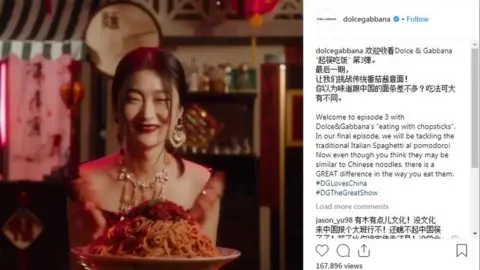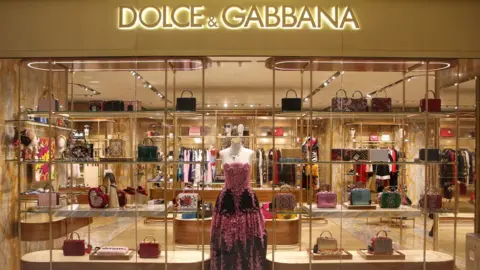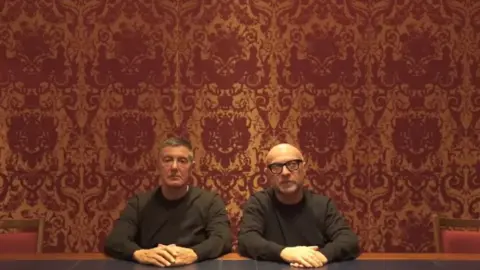'Racist' D&G ad: Chinese model says campaign almost ruined career
 Dolce and Gabbana/Instagram
Dolce and Gabbana/InstagramThe Chinese model featured in a Dolce & Gabbana ad campaign accused of racism has said the controversy almost ruined her career.
Three videos, released in November, showed Zuo Ye struggling to eat Italian food including cannoli and pizza with chopsticks.
Widely seen as offensive it led to a severe backlash in China with several retailers pulling the brand's products.
Ms Zuo said she felt "guilty and ashamed" but asked for understanding.
Following her statement on Chinese social media network Weibo, the debate has flared up again with some people saying they hope that she can continue her career as a model and that they understand her hands were tied working with D&G.
'It nearly killed my career'
In a long post on Monday, Ms Zuo said that usually working for an international brand like D&G would be an exciting career step but that in this case "it nearly killed off my modelling career".
She explains she understands that "it's about representing the national image of China and Chinese culture" and that she "therefore feels even more guilty and ashamed".
She also vowed to "improve my behaviour" in the future.
 Getty Images
Getty ImagesAccording to her statement, she knew the shoot was about trying Italian delicacies but that she felt very awkward when she was asked to eat food like pizza and pasta with chopsticks.
The director told her to show first shock and disbelief, then roll her eyes, and eventually delight and satisfaction at the presumed tastiness of said Italian dishes, she said.
The model explains that she didn't see the final clip before it was released.
She also writes she didn't receive any support during the backlash, even when she, her family and agent were all targeted in widespread attacks on social media.
Support and condemnation
Since Ms Zuo's post, opinion has been divided on Chinese social media.
While some see her as a victim of the Italian brand and sympathise with her experience, others remain critical saying she only had herself to blame.
Others again point out the problem with the powerlessness of models in the industry as a whole where they are often made to do things they might not necessarily want to do.
 Dolce and Gabbana
Dolce and Gabbana In November last year, D&G released the videos on social media ahead of a fashion show in Shanghai.
The entire campaign was accused of trivialising Chinese culture and promoting unflattering stereotypes.
"Chinese consumers are not naïve; they will spot insincerity and tokenism a mile off, and respond accordingly," Dr Julie Bilby of the department of media and communication at RMIT University in Melbourne told the BBC.
The controversy escalated further when screenshots were circulated showing designer Stefano Gabbana allegedly insulting China in an Instagram chat.
D&G insisted the account had been hacked and apologised publicly for the controversial ad campaign.
The Italian luxury company was forced to cancel the fashion show in Shanghai and their products were removed from several Chinese online retailers.
Consumers in China also called for a boycott of the brand.
